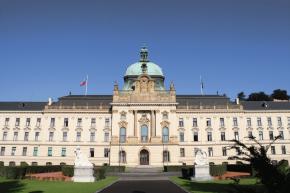
About nine million registered voters in a country with an estimated total population of 10.5 million, go to the polls Jan. 11 and Jan. 12 to elect the first president of the Czech Republic by public ballot. In the past, parliament has chosen the president. Twelve candidates, including three women, are vying for Prague's top post.
The country's roots date to 1198. Its population has dwindled from 15.5 million in 1990 but the country remains a crucial player in Central European politics as a member of the European Union.
In overall land size, at 30,450 acres, is just a little smaller than South Carolina.
If no one wins over 50 percent in the first round of the vote, a second-tier run-off will follow on Jan. 25-26.
The new president will be the third since the country became independent in 1993, when the former Czechoslovakia split in two.
Its first leader was the widely respected anti-communist playwright-turned-president Vaclav Havel, who died last year.
Big names in Czech political circles are running for the presidency. Although the role of the Czech President is mostly ceremonial, the winner of the 2013 election will be naming as many as eight out of 15 justices of the Constitutional Court of the Czech Republic, subject to the approval of the Senate.
That move could have a long-lasting impact on the country due to the court's power to void any laws enacted by parliament that are construed as being unconstitutional.
The January victor will replace President Vaclav Klaus, a controversial critic of the European Union. His second and last term ends in March. Both he and the late Havel were elected by parliament.
Former non-partisan prime minister Jan Fischer is touted as the odds-on favorite with 35.5-percent support, according to a Median agency survey in October. Fischer was prime minister from 2009 to 2010. He was also Czech's chief statistician at one time.
Former social democrat prime minister Milos Zeman, who led the country from 1998 to 2002, came second in the survey with 21.5-percent support. Fischer and Zeman were members of the Communist Party that ruled Czechoslovakia from 1948 to 1989.
But in an October Internet survey, all were overshadowed by Vladimir Franz, considered by some as an eccentric drama professor, artist and composer, according to the AFP news agency (Agence France-Presse).
Czech's current Foreign Minister Karel Schwarzenberg, former Senate chairman Premysl Sobotka and Tokyo-born businessman and Senator Tomio Okamura are also in the running.
The candidate list includes three women -- actress Tana Fischerova, European Parliament member Zuzana Roithova and former member of parliament Jana Bobosikova.
The Czech Republic is a landlocked country bordered by Germany to the west, Austria to the south, Slovakia to the east and Poland to the north. Its capital and largest city, with 1.3 million inhabitants, is Prague. The Czech Republic includes the historical territories of Bohemia and Moravia and a small part of Silesia.

 By
By 